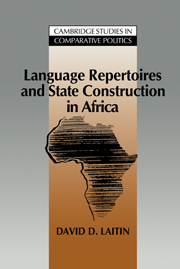Book contents
- Frontmatter
- Contents
- Preface
- PART I LANGUAGE REPERTOIRES AND THE STATE
- PART II SOCIOLOGICAL AND POLITICAL FORCES DESCRIBED
- PART III STRATEGIC THEORY APPLIED
- 6 Strategic theory and Africa's language future
- 7 Case studies from independent Africa
- PART IV CONCLUSION AND POLICY RECOMMENDATIONS
- Notes
- References
- Index
7 - Case studies from independent Africa
Published online by Cambridge University Press: 03 May 2010
- Frontmatter
- Contents
- Preface
- PART I LANGUAGE REPERTOIRES AND THE STATE
- PART II SOCIOLOGICAL AND POLITICAL FORCES DESCRIBED
- PART III STRATEGIC THEORY APPLIED
- 6 Strategic theory and Africa's language future
- 7 Case studies from independent Africa
- PART IV CONCLUSION AND POLICY RECOMMENDATIONS
- Notes
- References
- Index
Summary
Each of the three patterns of African national development that has been identified necessitates a distinct language repertoire. Citizens of states where there has been language rationalization need to become equipped to read and write in the official language of state business. And what about those who do not speak it? In Africa, few states with significant language minorities will carry out a rationalization program. But for those minorities, bilingualism will persist, perhaps for centuries. Nonetheless, if everyone within the state's boundaries becomes fluent in the state language, speakers of the nonchosen languages will find that they use them in a decreasing number of social domains. Intergenerationally, this situation pushes toward assimilation into the language of the state by all social groups. To be sure, historical memories of the language will remain, and some social strata – for example, religious diviners, or griots – will seek to maintain those memories. These memories will serve the interests of a counterhegemonic project, or regional revival, if conditions allow. Also, many citizens involved in technical work or international commerce will need to learn an international language. But for most purposes citizens will need to know but one language to fulfill themselves within the national arena.
For citizens of states that settle on a 2-language formula, each person will need to identify him- or herself with a regional language group. Interregional job mobility within the country will be somewhat constrained, because parents will find it difficult to get an education for their children in their own language outside of their geographical zone.
- Type
- Chapter
- Information
- Language Repertoires and State Construction in Africa , pp. 120 - 146Publisher: Cambridge University PressPrint publication year: 1992

